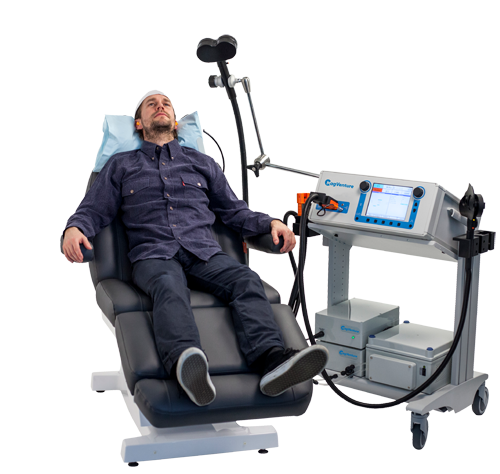A Proven Non-drug Treatment
Many Benefits of TMS Therapy
- FDA Cleared
- Non-drug
- Non-invasive
- No side effects of drugs
- Not ECT
- Long Lasting Relief
- Covered by Insurance
- Proven to work
423-764-2165
To set up a consultation
28 Midway St., Suite 1- Lower Level, Bristol, TN 37620
Magnetic energy similar to what is used in an (MRI) is used to stimulate the areas of the brain that are sluggish and causing depressed mood.

Clinical trials have demonstrated the safety and effectiveness of TMS Therapy in treating patients who have not benefited from prior antidepressant medication. TMS Therapy was studied in adult patients suffering from Major Depressive Disorder, all of whom had not received satisfactory improvement with previous treatments.
TMS stands for transcranial magnetic stimulation. It is used to treat depression by stimulating the brain non-invasively using electromagnetic fields, similar to those produced by an MRI machine. During TMS Therapy, a magnetic field is administered in very short pulses to the part of the brain that research has demonstrated to be associated with depression. The typical initial course of treatment is about 19-37 minutes daily over 4-6 weeks.
The Mgventure TMS Therapy system uses short pulses of magnetic fields to stimulate the area of the brain that is thought to function abnormally. The magnetic field produces an electric current in the brain that stimulates the brain cells (neurons). This results in changes that are thought to be beneficial in the treatment of depression and other mental illnesses.
TMS is non-systemic (does not circulate in the blood throughout the body), so it does not have side effects such as weight gain, sexual dysfunction, nausea, dry mouth, sedation, etc. The most common side effects reported during clinical trials were headache and scalp discomfort – generally mild to moderate – occurring less frequently after the first week of treatment.
No. TMS Therapy involves a unique method of using pulsed magnetic fields for therapeutic benefit. The intensity of the magnetic field is similar to that of the magnetic fields used in magnetic resonance imaging, or MRI. These techniques differ radically from the popular use of low intensity, static magnetic fields. These products deliver weak and undirected static fields that are not capable of activating brain cells.
© Highlands MindCare, PLLC- All Right Reserved
